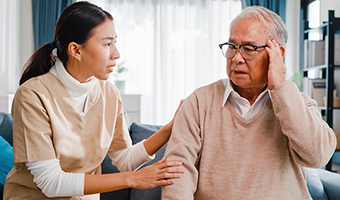3 Reasons Why Elderly Socialization is Critical
When you worry about how an elderly loved one is doing at home, your first thought may be their physical health and safety. Can they move around easily? Are they eating regularly and well? However, there’s another important factor to consider. Are they socially active, or are they at risk for senior isolation?
Unfortunately, senior isolation goes hand in hand with many common aspects of aging. Seniors with mobility issues may find it harder to visit with family and friends and take part in their favorite pastimes. Meanwhile, seniors who are experiencing memory loss or confusion may withdraw from their circles out of fear or self-consciousness.
In addition, many seniors will see their social circles shrink because they’ve left their jobs, their neighborhoods have changed, or because their friends have moved or passed away. As is common practice, their adult children may also live in different cities or states.
But why is senior isolation such a risk for seniors? And what can you do to keep your elderly loved ones more engaged with the world - especially in the age of COVID-19?
The Risks of Senior Isolation and How You Can Prevent It
As the world has changed because of COVID-19, many are discovering just how essential regular social contact is for their happiness, comfort, and quality of life.
While we’ve all been struggling with the ongoing social restrictions, it’s a good time to reflect on how essential socialization is for seniors, in particular, and how we can support our elderly loved ones.
There are three vital reasons why senior isolation is so risky, and why socialization is so important:
- Linked to poor health and cognitive decline
A recent study from the National Academies of Sciences, Engineering, and Medicine linked social isolation with a higher risk of stroke, heart disease, and dementia among seniors. - Lead to depression and self-neglect
Seniors who feel isolated may face a higher risk of depression. According to the National Institute on Aging, symptoms of depression among seniors can include irritability, a sense of hopelessness, a lack of interest in activities they enjoy, less energy, and poor sleeping or eating habits. - Improvement in mood and a higher quality of life
Routine visits and planned activities can provide structure and purpose and can keep seniors rooted in their communities at a time when so much is changing around them. It can also help them feel more connected to themselves.
Unfortunately, many seniors who may not have been concerned about senior isolation and its risks are now exposed to this issue due to COVID-19. Some care providers emphasize the need to prioritize human contact.
Contact Visiting Angels for More Information
While only time will tell the effects of social restrictions linked to COVID-19, it’s clear that socialization is an essential need.













